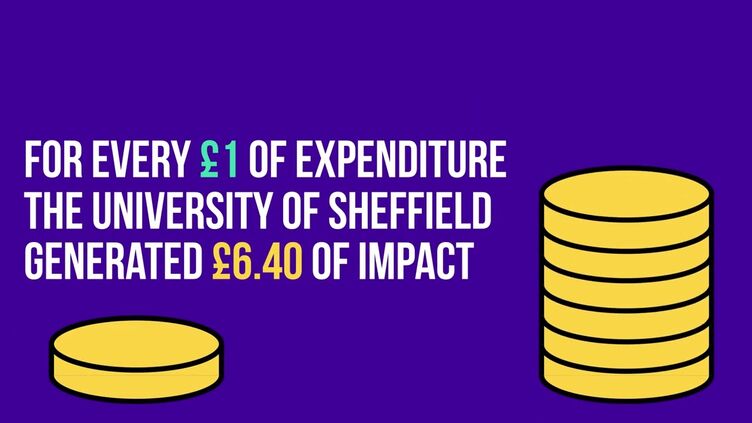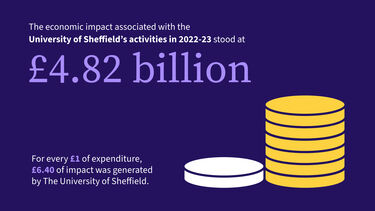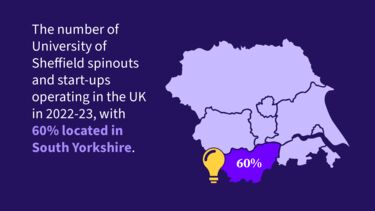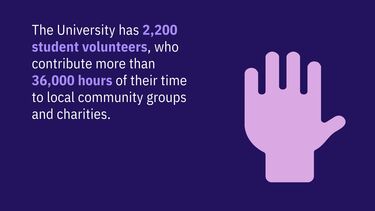Our economic and social impact
The University of Sheffield’s impact extends across the city, region, and UK. Through education, skills development, research commercialisation, and community engagement we’ve improved lives and fuelled economic growth.
About our social and economic impact
More than a century ago, the University of Sheffield was established on civic principles, a foundation that continues to drive our commitment to delivering economic, health, educational, social, and cultural benefits to Sheffield and beyond.
To gain a deeper understanding of our impact, particularly in South Yorkshire, we commissioned a study by London Economics.
Their analysis, focusing on the 2022-23 academic year, provides compelling evidence of the University's significant economic and social contributions to the city, region, and the UK.
The findings demonstrate how critical universities like ours are to the long-term economic and social prosperity of the UK – whether that is here in our region, or on a national or global scale. The government has been clear that it wants universities to make an even stronger contribution to economic growth, while increasing their civic role.
Professor Koen Lamberts
President and Vice-Chancellor of the University of Sheffield
Key economic impact findings
- The total economic impact associated with the University of Sheffield activities in 2022-23 stood at £4.82 billion
- For every £1 of expenditure, £6.40 of impact was generated by The University of Sheffield
- The estimated impact of the University research and knowledge exchange activities stands at £1.8 billion
- The impact of the University’s expenditure on the UK economy stood at £539 million
- The University generated £55 million of intellectual property (IP) licensing income
- The impact of the 2022-23 cohort of international students stood at £1.3 billion.
Regional impact
- Our activities supported a total of 22,990 full time jobs across the UK economy in 2022-23 and over half of the University of Sheffield’s regional impact is felt in Yorkshire and the Humber, of which more than 80% occurs in South Yorkshire.
- The number of University of Sheffield spinouts and start-ups operating in the UK in 2022-23, with 60% located in South Yorkshire.
- University of Sheffield graduates remain in Yorkshire and the Humber than from any other regional institution, and our graduates achieve higher rates of sustained employment or further study compared to other Russell Group universities in Great Britain.
Social impact
- The University has 2,200 student volunteers, who contribute more than 36,000 hours of their time to local community groups and charities.
Our healthcare students also make an impact even before graduation, in 2022-23, 750 students contributed over 365,000 hours to NHS clinical placements, directly improving patient lives.
Our universities are vital to the regional economy, and they help us to showcase just how much Sheffield has to offer on a global scale. The University is an important partner, and we look forward to continuing our relationship, driving economic growth and building on Sheffield's status as a vibrant, warm and welcoming place to live, work and study.
Councillor Martin Smith
Chair of the Economic Development and Skills Committee at Sheffield City Council
Case Studies
- Advanced Manufacturing Research Centre (AMRC)
Bridging the gap between academia and industry is the University of Sheffield’s Advanced Manufacturing Research Centre (AMRC). With 100 industrial partners, including Boeing, McLaren, and Rolls-Royce, the AMRC’s cutting-edge collaborations are shaping the advanced manufacturing sector not just in the UK, but across the globe. Data released in a 2022 Impact Analysis report by Lichfields illustrated the economic benefits attributable to the AMRC, including attracting over £260 million of inward investment into the South Yorkshire manufacturing cluster, training over 1,700 apprentices, and creating 520 high value jobs during its first 20 years of operation. The same report found that AMRC workers also earn 46% higher than the South Yorkshire average reflecting the high value and productivity of the workforce. This success of the AMRC in stimulating regeneration and growth has also been ‘exported’ to other areas of the UK, with AMRC North West established to catalyse investment and development on the Samlesbury Enterprise Zone in Lancashire; and AMRC Cymru supporting the delivery of Airbus UK’s ‘Wing of Tomorrow’ programme in Broughton, which was seen as critical to safeguarding 6,500 jobs at Airbus and thousands more in the supply chain.
The University of Sheffield’s partnership with Boeing
The 24-year partnership between the AMRC and Boeing paved the way for translational research which underpinned Boeing’s decision to build its only manufacturing site in Europe in Sheffield. In 2024, the team were presented with the Bhattacharya Award, a prestigious honour backed by the UK government that recognises sustained industrial collaboration, and its benefits to academia, business, and the UK economy.
In 2023, the AMRC announced a groundbreaking £80m research programme, Composites at Speed and Scale (COMPASS), with a new open-access innovation facility in Sheffield. Boeing’s largest research and development project, Isothermic High-Rate Sustainable Structures (IHSS), will be the first project to be undertaken within the facility. IHSS aims to de-risk and develop high-rate sustainable structures with the potential to reduce large component process times from 40 hours to approximately four hours, and help the aviation industry reach net zero. The Boeing-led project will initially create around 50 jobs in South Yorkshire and, based on existing and forecasted aircraft demand, has the potential to create 3,000 UK jobs long-term, and around £2 billion annually in export opportunities.
- Food Ladders
Improving food security in the UK Food Ladders is an innovative evidence-based framework developed in Sheffield that is helping organisations provide new ways to tackle hunger vulnerability, poor nutrition, and social isolation. By following the Food Ladders approach, local communities can plan for future actions and pool resources to create a strengthened community and build long-term resilience.
Sheffield is just one of many local authorities across the country using the food ladders to structure locally focused interventions aiming to increase community resilience, improve public health, and address issues of isolation and loneliness. Recently, researchers developed a Food Ladders tool kit for local authorities, and representation from Sheffield and Doncaster councils were involved in its co-production. Alongside this, national charities (FareShare, The Bread and Butter Thing, Feeding Britain, Comic Relief) as well as trusts (Greggs Foundation) are using the Food Ladders to structure how they allocate resources and ensure all rungs of the ladder are supported.
Using green spaces to feed the population
At the Institute for Sustainable Food, the University aims to ensure everyone has equitable access to nutritious foods, while also protecting natural resources.
Urban horticulture, i.e. growing fruits and vegetables in cities, could make an important contribution to UK food security. The University of Sheffield’s researchers found that expanding urban horticulture into just one tenth of land potentially available for food growing in Sheffield could provide nearly 90,000 people with their 5-a-day. Fruit and vegetable consumption is crucial to a healthy food-secure population, and the University’s researchersfound that people who grow-theirown eat 6.3 portions of fruit and vegetables a day, more than their recommended 5-a-day (70% more than the UK national average), alongside other benefits including improved physical and mental health, nature connectedness, social capital, and community cohesion.
Developing planet-friendly foods As global demand for protein increases, plant-based substitutes are needed to mitigate the carbon footprint of traditional agriculture. University spinout ReNewFood is harnessing nature’s fermentation process to bring a whole new palette of flavour proteins to enhance access to alternative foods. Sheffield is also the co-lead of a new £38 million centre that seeks to develop planet-friendly alternatives to animal protein.
The University will lead on the National Alternative Protein Innovation Centres (NAPIC) research to deliver health-enhancing protein alternatives that are both affordable and appealing to the public. The NAPIC will generate a broad range of new industry-funded research projects which aim to drive industrial adoption of alternative proteinbased products and innovative processes, fostering a diverse workforce with many new skilled jobs in the sector and excellent return on investment. The researchers will also identify new business opportunities for farmers and producers, and work to future-proof the UK’s protein supply against reliance on imports.
- Future High Streets and Castlegate
If you stroll down Sheffield’s High Street or Fargate, you will witness the continued transformation of the city centre taking shape. The University of Sheffield played a central role in this regeneration through the its support for Sheffield City Council’s successful Future High Streets Fund bid, securing £15.8m to bring to life a shared vision of a future-proofed city centre catering to visitors of all ages. The University's support, which included developing a VR experience of a future Fargate, producing architectural designs and conducting planning workshops with over 120 stakeholders, helped showcase the area's potential as a creative and cultural hub. These workshops informed plans on various aspects, from flood defences to the use of urban space.
Connecting local communities with the University’s research
And it does not stop there. Over the past decade, the University has worked with Sheffield City Council, civic organisations, local businesses, and community groups to co-produce a vision for the regeneration of Sheffield’s historic Castlegate area.
Live Works, a city-centre based initiative led by the University of Sheffield's School of Architecture and Landscape, was instrumental in this grassroots redevelopment through connecting local communities with the University’s design and research experts. University of Sheffield archaeologists also played a key role in analysing past archaeological studies of the area to uncover the rich history and importance within the Sheffield city landscape.
This work helped to attract £17.5M in Levelling Up funding which includes (among other regeneration projects), the development of a new city park on the site of Sheffield Castle and the restoration of a landmark Grade II* listed heritage building to create Harmony Works, a new cultural/education centre for young musicians from across the region.
Grey to green
The University of Sheffield’s landscape research and expertise inspired the UK’s largest inner city ‘green corridor’, which saw the Sheffield City Council-led transformation of 1.3km of redundant highways into lush vegetated public spaces that also work to prevent flooding. The Grey to Green project created jobs and demonstrated a 561% increase in biodiversity while rejuvenating a dilapidated area of the city for all to enjoy.
- Sustainable Aviation Fuels Innovation Centre
The aviation industry is one of the fastest growing sources of greenhouse gas emissions, but one of the most difficult to decarbonise. Sustainable aviation is vital to reducing global carbon emissions – and, without it, we cannot achieve net zero.
In 2023, the first transatlantic flight using 100 percent Sustainable Aviation Fuel (SAF) took off with the help of University of Sheffield researchers from the Sustainable Aviation Fuels Innovation Centre (SAF-IC) - the UK’s first research and testing centre of its kind. Located in the University of Sheffield Innovation District, SAF-IC provides a space for fuels to be developed, tested, and certified, helping new fuels come to market quicker. SAF-IC worked with the Virgin Atlantic-led consortium to confirm that the fuel, made from waste products, delivers carbon dioxide lifecycle emissions savings by up to 70 per cent compared to the traditional jet fuel it replaces. In April 2024, the University was selected as the delivery partner for the UK’s SAF Clearing House, helping to position the UK at the forefront of decarbonising the global aviation industry.
- The Julia Garnham Centre
In 2021, the University of Sheffield and Sheffield Children’s NHS Foundation Trust launched the Julia Garnham Centre, a new NHS-badged genomics facility in Firth Court. The centre provides placements to students for them to develop key diagnostic skills from a team of 20 NHS experts and academic staff. These experiences are instrumental in progressing their understanding of genomics and healthcare and boosts their employability. The output of placement work helps the NHS reduce rare disease and cancer backlogs requiring specialist analysis, and simultaneously supports the development of the future workforce.
Sheffield alumna Maisy Wilkes dedicated her time to working with clinicians at the Julia Garnham Centre during her studies. In 2024, she received the University of Sheffield's prestigious Chancellor’s Medal for her work in accelerating diagnosis and treatment access for patients with rare cancers and is now a geneticist at Synovis at Guy's and St Thomas' NHS Foundation Trust.
- Future Greens
In January 2024, four University of Sheffield graduates from across the globe secured substantial backing for a sustainable vertical farming startup, Future Greens. After pioneering a circular system for growing food sustainably, the team is now focused on unlocking the benefits of circularity for food manufacturers that generate inevitable organic waste. Gabrielė, an Artificial Intelligence and Computer Science student from Lithuania and one of the cofounders of Future Greens, undertook a nine-month internship with the University Sheffield’s Emerge: Be Enterprising team. Here, she said the skills she acquired during her internship and studies were crucial in getting the company up and running. Future Greens is based in a former Sheffield steel mill, after moving from its initial base at Sheffield Technology Park’s Cooper Project - an initiative designed to help tech entrepreneurs with tailored startup support.




